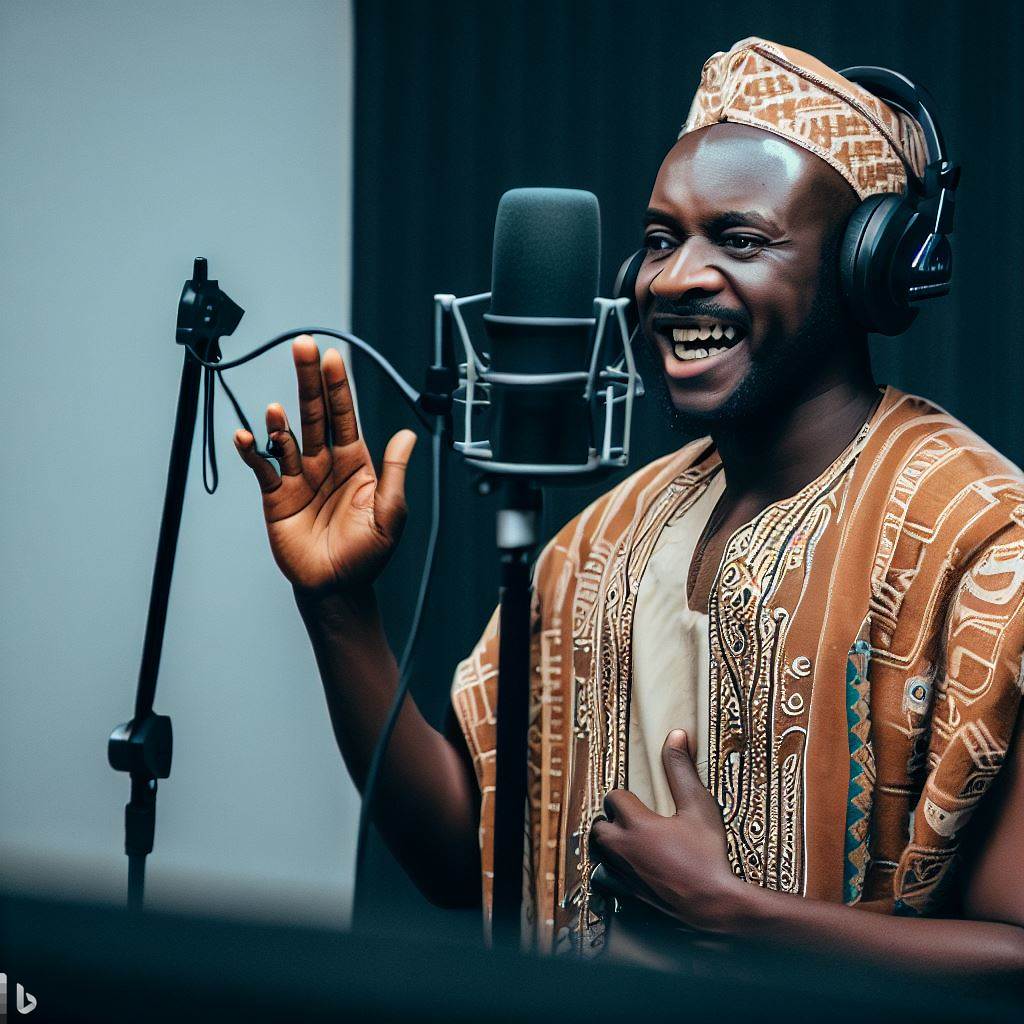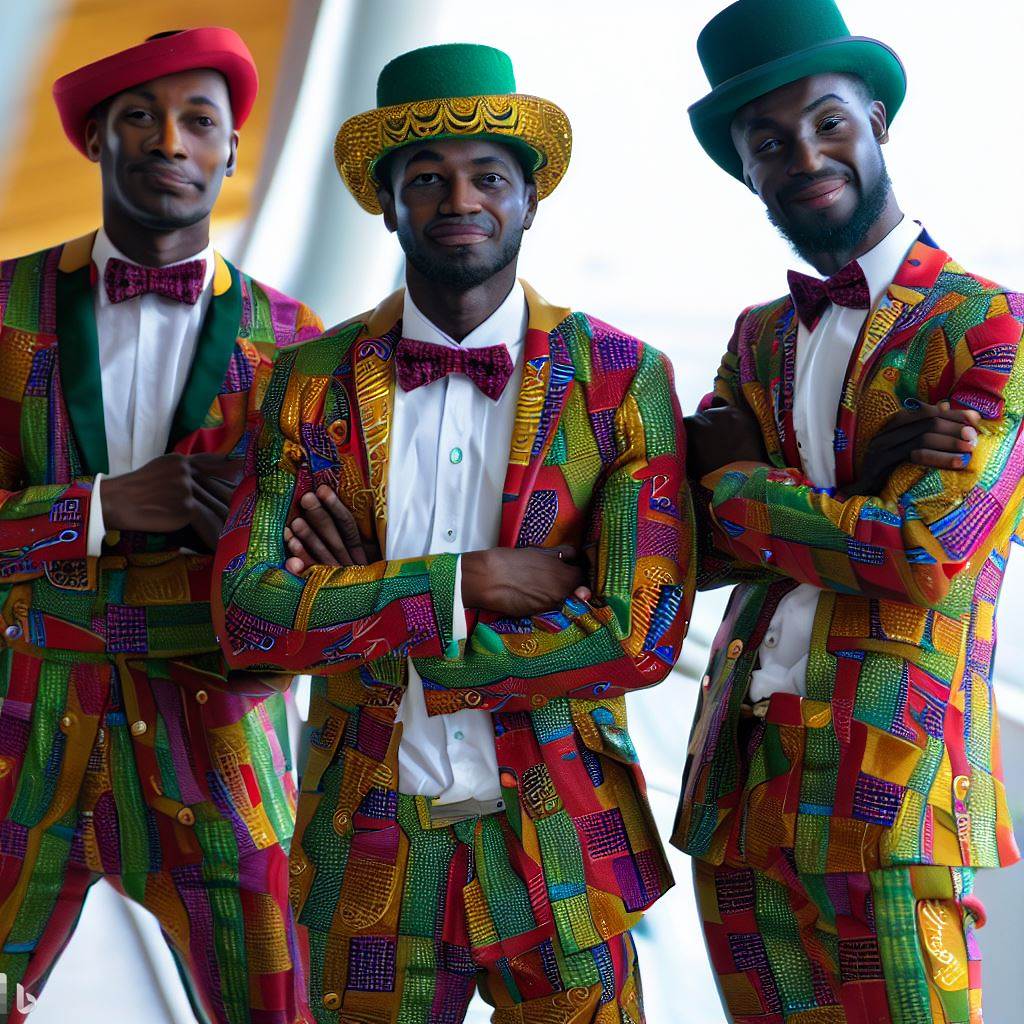Introduction
In this blog section, we will explore the fascinating world of voice acting in Nigeria, specifically focusing on the use of local languages.
Nigeria’s voice acting industry is known for its vibrant and diverse talent pool.
Nigeria is a country with over 250 linguistic groups and a rich cultural heritage.
In the voice acting scene, the use of local languages plays a significant role in connecting with the audience.
It adds authenticity and relatability to the characters portrayed.
Nigeria’s voice acting industry has seen remarkable growth in recent years.
With a booming movie industry, known as Nollywood, and an increasing demand for animated content, voice actors have a wide range of opportunities to showcase their skills.
One of the reasons local languages are emphasized in Nigeria’s voice acting scene is to ensure that the characters accurately represent the different ethnic groups within the country.
This emphasis not only reflects the diversity of Nigeria but also promotes cultural understanding and appreciation.
Voice actors in Nigeria are often bilingual or multilingual, allowing them to seamlessly switch between English and local languages.
This versatility enables them to cater to a broader audience and bring characters to life with more depth.
In essence, Nigeria’s voice acting industry is thriving, with local languages playing a significant role in creating authentic and relatable characters.
By embracing linguistic diversity, voice actors contribute to the rich cultural tapestry of Nigeria’s entertainment scene.
Overview of Nigeria’s Voice Acting Scene
A. Growth and popularity of voice acting in Nigeria
Nigeria’s voice acting scene has experienced significant growth and popularity in recent years.
The demand for voice actors has increased due to the expansion of the entertainment industry and the rise of animated content.
One of the factors contributing to the growth of voice acting in Nigeria is the country’s large population and diverse culture.
With hundreds of languages spoken in Nigeria, there is a need for voice actors who can cater to different linguistic groups.
B. Popular voice actors in the country
Over the years, several voice actors in Nigeria have gained popularity and have become household names.
Their distinct voices and exceptional talent have made them sought-after in the industry.
Here are some of the most popular voice actors in Nigeria:
- Kunle Bantu: Known for his deep and captivating voice, Kunle Bantu has lent his voice to numerous radio dramas, animated films, and commercials. His ability to bring characters to life is unparalleled.
- Adaeze Ochonogor: Adaeze’s versatility in voice acting is commendable. She effortlessly switches between accents and characters, making her a favorite among directors and producers.
- Ifeanyi Ejiofor: With a voice that commands attention, Ifeanyi Ejiofor has established himself as one of Nigeria’s top voice actors. His deep baritone voice is perfect for narrations and documentaries.
- Chioma Nwosu: Chioma’s youthful voice and ability to portray a wide range of emotions have made her a favorite among animated film producers. Her voice brings warmth and life to every character she voices.
- Chidi Nzelu: Chidi Nzelu’s distinctive voice and brilliant delivery have earned him numerous accolades in the voice acting industry. He is known for his ability to breathe life into both animated and live-action characters.
- Tunde Akinsanmi: Tunde’s voice is recognized for its richness and resonance. He has voiced characters in several popular animated films and is highly regarded for his professionalism and dedication to his craft.
The popularity of Nigerian voice actors has garnered international attention.
Many have worked on global projects. The growth is driven by local animation studios and companies investing in talent.
Nigeria’s voice acting scene thrives thanks to talent, diversity, and industry support.
Read: Breaking Into Animation Voice Acting in Nigeria
The Importance of Local Languages in Voice Acting
In Nigeria’s voice acting scene, the diversity of local languages plays a crucial role.
Using local languages in voiceover productions not only adds authenticity but also enhances communication with the target audience.
Here, we will delve into the significance of incorporating local languages in voice acting, providing examples of successful voiceover projects that have utilized this approach.
A. Diversity of Local Languages in Nigeria
Nigeria is a linguistically diverse country, with over 500 different languages spoken across its various regions.
These languages belong to different language families, such as Niger-Congo, Nilo-Saharan, and Afro-Asiatic.
The major ethnic groups in Nigeria, including the Hausa, Yoruba, and Igbo, have their unique languages.
However, numerous other minority languages are also spoken by smaller ethnic groups across the country.
B. Importance of Using Local Languages in Voiceover Productions
When it comes to voice acting, incorporating local languages holds immense importance in terms of authenticity and audience connection.
- Using local languages allows voice actors to accurately portray the cultural context of the characters they are voicing.
- This authenticity helps in creating a more compelling and relatable performance.
- It also enables voice actors to effectively communicate with the target audience.
- It allows them to connect on a deeper level, as language plays a significant role in conveying emotions and messages.
- Using local languages in voiceover productions can provide educational benefits.
- It helps in preserving and promoting indigenous languages, preventing their erosion and contributing to the cultural heritage of Nigeria.
C. Examples of Successful Voiceover Projects Using Local Languages
Several remarkable voiceover projects in Nigeria have effectively utilized local languages:
- Bino and Fino: This animated children’s series aims to teach African culture, history, and languages to young viewers.
It incorporates Nigerian languages like Yoruba and Igbo, promoting language diversity and cultural understanding. - Radio Drama for Health: Local language radio dramas raise health awareness, covering HIV/AIDS and maternal-child health.
These dramas have proven effective in reaching and educating diverse communities across Nigeria. - Marketing Campaigns: Nigerian ad campaigns use local languages to connect with the audience, boosting brand recognition and consumer resonance.
The success of these voiceover projects emphasizes the power and importance of incorporating local languages in Nigerian voice acting.
In fact, Nigeria’s voice acting scene benefits greatly from the diversity of local languages.
Using local languages in voiceover productions enhances authenticity, improves audience connection, and contributes to cultural preservation.
With the examples of successful projects mentioned, it is evident that incorporating local languages is a valuable aspect of voice acting in Nigeria.
Read: Nollywood and Its Impact on Voice Acting in Nigeria

Challenges Faced by Voice Actors in Local Languages
A. Overview of the unique challenges local language voice actors encounter
Voice acting is a challenging field, and it becomes even more challenging when it comes to local languages in Nigeria’s voice acting scene.
Local language voice actors encounter unique challenges that are not faced by their counterparts working in English. Let’s take a closer look at some of these challenges.
1. Limited Resources and Opportunities
One of the main challenges faced by voice actors in local languages is the limited availability of resources and opportunities.
Unlike English voice actors, local language voice actors often struggle to find scripts, training materials, and recording studios that cater to their specific language needs.
Additionally, the demand for local language voice acting is relatively low compared to English.
This limited demand translates into fewer job opportunities for local language voice actors, making it difficult for them to establish a successful career in the industry.
2. Overcoming Language Barriers
Voice actors in local languages also face the challenge of overcoming language barriers.
Many local languages in Nigeria have intricate dialects and nuances that can be difficult to capture accurately in voice acting.
It requires extensive knowledge of the language and its cultural context to deliver a convincing performance.
Additionally, local voice actors lack access to adequate training and mentorship to refine language skills and master nuances.
Without proper guidance, it becomes even more challenging for them to compete with their English voice acting counterparts.
3. Efforts made by industry stakeholders to address these challenges
Recognizing the unique challenges faced by voice actors in local languages, industry stakeholders have made efforts to address these issues and provide support to local language voice actors.
- One such initiative is the establishment of specialized training programs and workshops designed specifically for local language voice actors.
- These programs aim to provide them with the technical skills and knowledge required to excel in their craft.
- Industry organizations and associations have also played a crucial role in advocating for the inclusion of local language voice actors in more projects.
- This has helped in creating awareness about the importance of diversity and representation in the voice acting industry.
Voice actors in local languages face unique challenges that require specialized resources and opportunities.
Limited availability of scripts, training materials, and recording studios coupled with language barriers make it difficult for them to establish a successful career.
However, with the efforts of industry stakeholders, there is hope for a more inclusive and supportive voice acting scene for local language performers in Nigeria.
Read: Voice Acting Rates: Understanding Pay in Nigeria
Success Stories of Local Language Voice Actors
Successful voice actors who have made a name for themselves using local languages
In Nigeria’s voice acting scene, there have been numerous success stories of voice actors who have made a name for themselves by using local languages.
- Chiwetalu Agu: Known for his incredible talent, Agu has carved a niche for himself with his captivating voice in Igbo language voiceovers.
- Sadiq Daba: Daba gained recognition for his exceptional voice acting skills in Hausa language, which led to roles in Nollywood movies.
- Joke Muyiwa: Muyiwa is renowned for her versatility in Yoruba language voiceovers, captivating audiences with her distinct voice.
- Yakubu Mohammed: With his exceptional voice acting abilities in Hausa language, Mohammed has become a prominent figure in the industry.
- Pete Edochie: Edochie’s powerful voice and command of the Igbo language have earned him accolades and a dedicated fanbase.
These voice actors have shown that local languages can be a powerful tool in voice acting and storytelling.
Their success has not only elevated their careers but also highlighted the richness and diversity of Nigeria’s languages.
Examples of Voiceover Projects featuring Local Languages
Several voiceover projects in Nigeria have gained recognition and accolades for their exceptional use of local languages.
- Egwu Eke: This animated series tells stories in Igbo language, captivating both young and old audiences.
- Bincike: Bincike, a radio drama series in Hausa language, addresses social issues and has won multiple awards.
- Jenifa’s Diary: This popular TV series features a mix of English and Yoruba language, showcasing the beauty of Yoruba culture.
- Abun Da Ya Sa Nake So: A radio drama series that addresses women empowerment issues in Hausa language, increasing awareness and promoting change.
- Living in Bondage: This classic Nollywood movie highlights the power of local languages, with scenes in Igbo and pidgin English.
These projects have not only entertained audiences but also played a significant role in preserving local languages and cultures in Nigeria.
They prove that local languages can be the driving force behind exceptional voiceover projects.
Basically, Nigeria’s voice acting scene boasts incredible success stories of voice actors who have utilized local languages to make a name for themselves.
These actors have shown the power and beauty of local languages in voice acting, capturing audiences’ attention and earning recognition.
Furthermore, various voiceover projects have successfully incorporated local languages, gaining accolades and contributing to the preservation of Nigeria’s cultural heritage.
The combination of talented voice actors and the use of local languages in voiceover work has made Nigeria’s voice acting scene truly remarkable and diverse.
Read: How to Start Your Voice Acting Career in Nigeria
See Related Content: Success Stories of Prominent Nigerian Music Publishers
Promoting Local Languages in Nigeria’s Voice Acting Scene
A. Importance of promoting local languages in voice acting
When it comes to voice acting in Nigeria, there is a growing need for the promotion and preservation of local languages.
Local languages play a significant role in the country’s rich cultural heritage, and voice acting is an excellent medium to showcase their beauty and importance.
B. Initiatives and organizations working towards promoting local language voiceover talent
Initiatives and organizations have emerged to address this need and ensure that local languages have a prominent place in Nigeria’s voice acting scene.
Here are some noteworthy initiatives and organizations working towards promoting local language voiceover talent:
- Nollywood Voice Workshop: This workshop aims to train aspiring voice actors in local languages, providing them with the necessary skills and expertise to work in the industry.
- Local Language Voiceover Competitions: Various competitions have been launched to encourage voice actors to showcase their talents in local languages. These competitions create awareness and recognition for local languages in the industry.
- Local Language Dubbing: Some production companies have started dubbing foreign films and TV shows into local languages. This not only promotes local languages but also makes content more accessible to a wider audience.
- Collaboration with Language Experts: Studios collaborate with language experts, ensuring authenticity and accuracy in actors’ performances.
- Increasing Demand for Local Language Voiceovers: Production firms and ad agencies see the value in local languages, driving demand for fluent voice actors.
C. Suggestions for further promoting and preserving local languages in the industry
However, there is still more that can be done to further promote and preserve local languages in Nigeria’s voice acting industry:
- Educational Programs: Introducing local language voice acting courses in schools can inspire young talents and foster a skilled pipeline of voice actors.
- Collaboration with Broadcasting Stations: Radio and TV stations can promote local languages by airing more content, including voice acting performances.
- Subtitling in Local Languages: Adding local language subtitles to foreign content exposes viewers to spoken and written local languages, beyond dubbing.
- Supporting Local Language Voice Acting Associations: Funding local voice acting associations enables language promotion events and campaigns.
- Creating Online Platforms: Creating online platforms for local language voice acting talent boosts visibility and global reach.
Most importantly, promoting local languages in Nigeria’s voice acting scene is crucial for preserving the country’s cultural diversity and heritage.
By supporting initiatives, collaborating with experts, and implementing educational programs, the industry can ensure that local languages continue to thrive within the vibrant world of voice acting.
Conclusion
Local languages play a significant role in Nigeria’s voice acting scene. They bring authenticity and cultural richness to various projects.
However, local language voice actors face several challenges, such as limited opportunities and recognition.
It is crucial for the industry to prioritize and support local language voiceover talents.
This can be done by creating more opportunities for them, promoting their work, and providing necessary resources and training.
Producers and directors should actively cast local language voice actors for accurate representation.
Investing in local language voice acting preserves Nigeria’s linguistic heritage and storytelling traditions.
Let’s celebrate and empower them, fostering an inclusive and vibrant voice acting industry in Nigeria.




